PREMIUM CONTENT ARTICLE
In December of 2022, Wang Wenbin, top diplomat and the 32nd spokesperson for China’s Ministry of Foreign Affairs, was spotted out and about at Huangshan Mountain by Chinese netizens.
Soon, videos of Wang spread on Weibo and Douyin, where many people expressed excitement about seeing the top diplomat at the popular tourist spot and outside of the usual formal setting.
Wang Wenbing (汪文斌, b. 1971) is the Deputy Director of the Foreign Ministry Information Department of China. He studied at China’s Foreign Affairs University, majoring in French and economics, and has been working for China’s Foreign Ministry since 1993. Wang previously also took up the post as ambassador in Tunisia from 2018 to 2020.
Wang was in Huangshan, Anhui, to attend a visit of various international VIP guests from the IMF, World Bank, OECD, etc. on the occasion of the Seventh “1 6” Roundtable, which convened in the province of Anhui. Wang Wenbin originally is from Xindu village in Tongcheng, Anhui.
The fact that Wang was spotted in Anhui at that time was noteworthy. It was the first time since Covid that various Chinese officials welcomed and entertained international guests, marking an end to China’s zero-Covid era; and it was all taking place in Wang’s home province, where he is also known as “Anhui’s pride.”
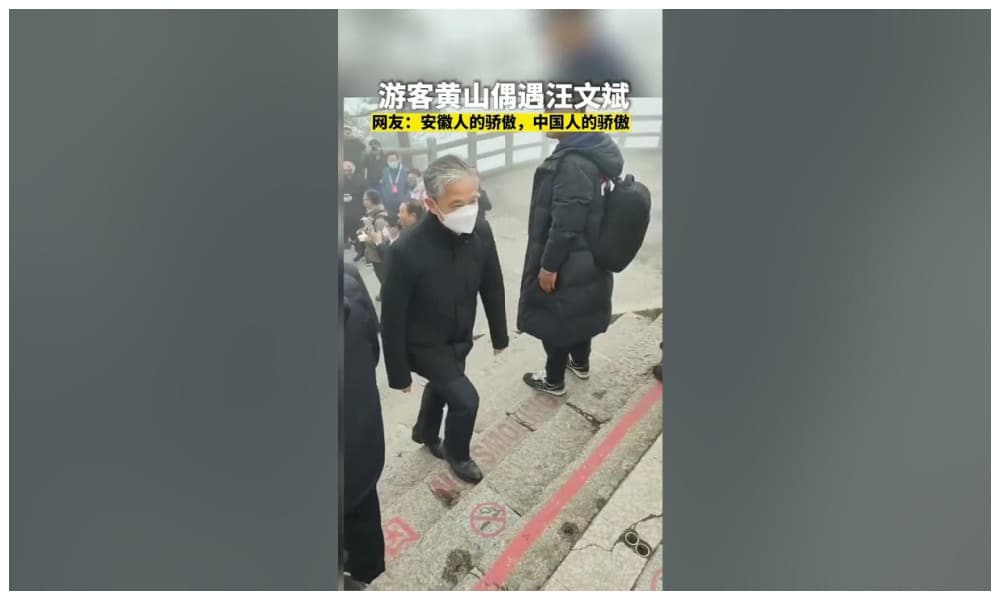
Wang Wenbin, top diplomat and spokesperson for China's MFA, was out and about in Anhui, and many people were happy to see him IRL and posted their videos of him on social media,calling him “the pride of Anhui, the pride of China.”
The 2022 excitement on Chinese social media surrounding the new Wang Wenbin videos went far beyond ‘Anhui’s pride’ alone; it showed the wider popularity of the top official on Chinese social media and signaled a broader trend of Chinese diplomats becoming online celebrities.
From fan videos on Douyin (TikTok) and Bilibili to discussion threads on Zhihu, Chinese diplomats have become idolized on social media over the past few years. Besides all the fan accounts on various Chinese social media platforms, Wang Wenbin also has dedicated ‘super topic’ communities on Weibo, which are forums focused on particular topics or celebrities.
There is the “Wang Wenbin Super Topic” page and also the “Wang Wenbing Exchange” (汪文斌交流) and the Wang Wenbin’s Bin’s Sweets” forum (汪文斌的斌糖). These public online forums contain thousands of posts dedicated to Wang.
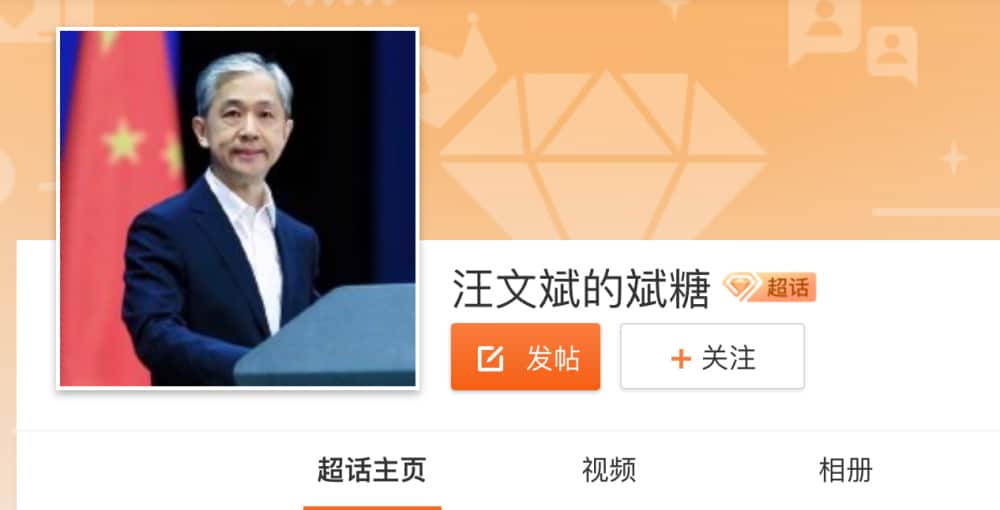
One of the supertopic forums on Weibo dedicated to Wang Wenbin.
The Wang Wenbin supertopic pages are all about content featuring Wang in his role as the spokesperson of the Foreign Ministry, replying to various questions during regular press conferences. Netizens are creative in editing images of Wang, adding quotes or drawings, and they make special fan videos.
Some of these videos have added texts or special effects, showing Wang Wenbin surrounded by sparkles and floating hearts as a sign of affection. Commenters praise Wang for being “so simple, so assertive,” while others complement the diplomat on being so “hard-working,” “concise and comprehensive.”
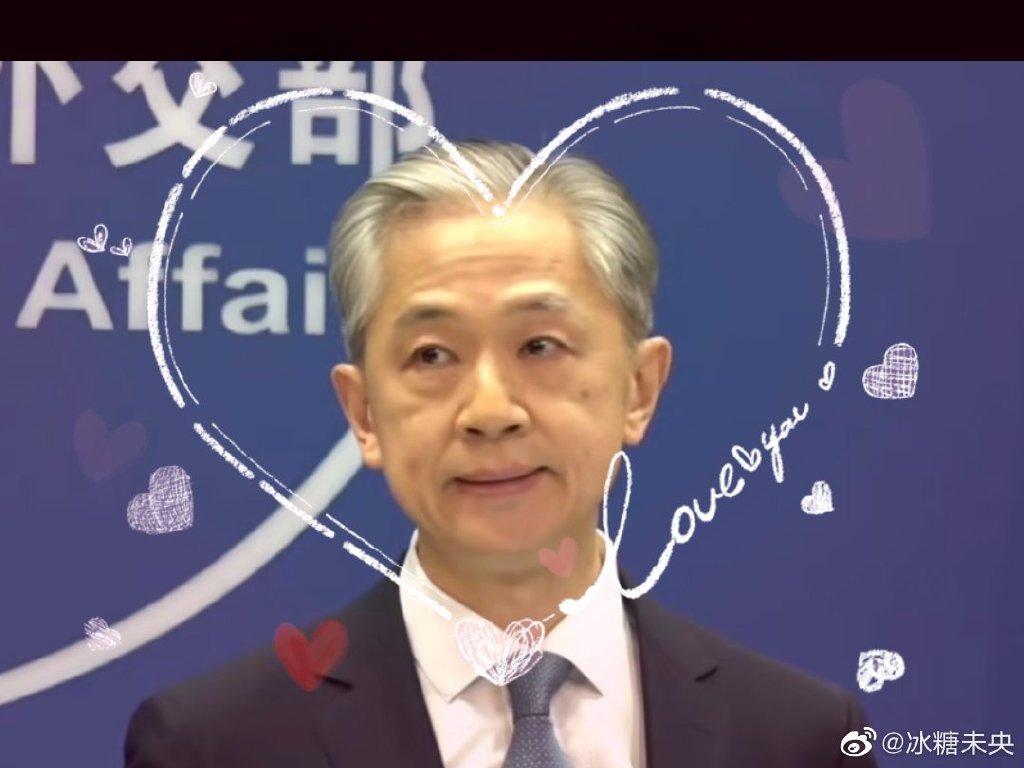
Wang Wenbin ‘fan art’ on one of the supertopic pages.
There are also those who praise Wang’s looks and expressions, saying his facial features are “handsome,” “cute,” “adorable,” and saying that ‘Uncle Wang’ is just too “cool.”
At a time of growing U.S.-China tensions and recurring international hot issues including China’s stance on the war in Ukraine and the Taiwan question, Wang Wenbin and his immediate colleagues Mao Ning (毛宁) and Hua Chunying (华春莹) are featured more prominently on social media by official media accounts that highlight answers given during the regular Foreign Ministry press conferences, which are held five times per week.
As Wang Wenbin is given greater visibility on Chinese social media by state media accounts, the online fan communities dedicated to Wang grow more lively as they have more material to express their enthusiasm about the Foreign Ministry spokesperson.
DIPLOMAT DREAM TEAM
Chinese Diplomats Becoming Celebrities
Wang is not the first Chinese top official or diplomat to become an online celebrity. Former Foreign Ministry spokesperson Zhao Lijian (赵立坚) previously also became very popular among Chinese netizens.
Zhao rose to popularity in 2020, the year he started his job as the spokesperson for the Ministry of Foreign Affairs (MFA), and many netizens loved him for his “disarming smile” and because of his demeanor, as many joked Zhao often looked like he could not wait to get off work.
An online meme culture developed around Zhao, who often repeated certain phrases or expressions during press conferences. Among them was the expression “shìmù yǐdài” (拭目以待), to eagerly wait for something to happen, literally meaning “to wipe one’s eyes and wait” (e.g. he used it in 2022 in the context of China waiting to see if Pelosi would actually dare to visit Taiwan or not). Phrases such as these became widely known and were used in affectionate online jokes about Zhao.
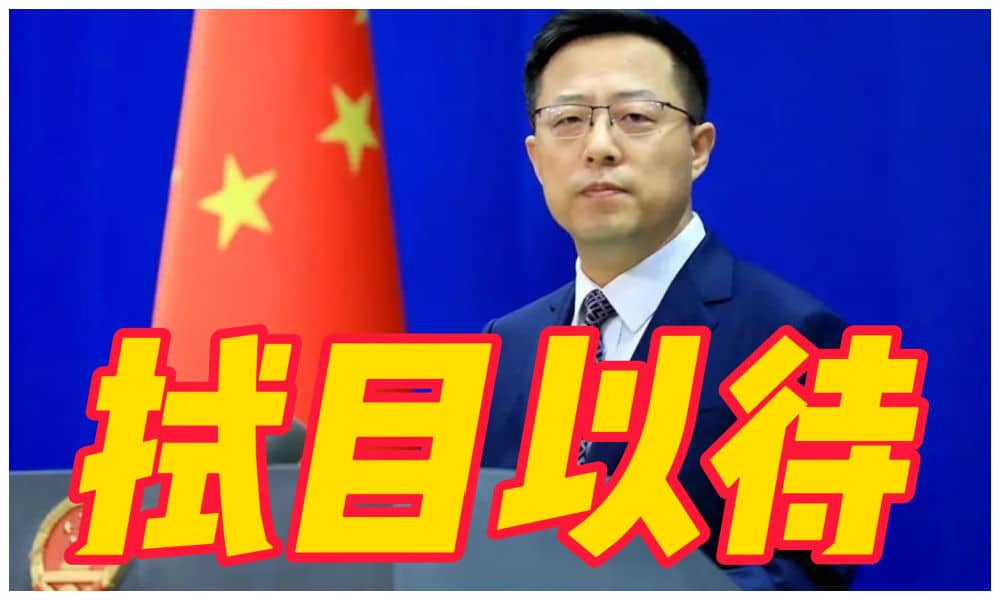
Shìmù yǐdài 拭目以待, to eagerly wait for something to happen, literally “to wipe one’s eyes and wait,” is one of Zhao Lijian’s famous phrases.
Even though Zhao was moved from his position as spokesperson and transferred to the Boundary and Ocean Affairs department earlier in 2023, there are still online communities dedicated to him where new posts with Zhao-related images, gifs, and videos keep flooding in.
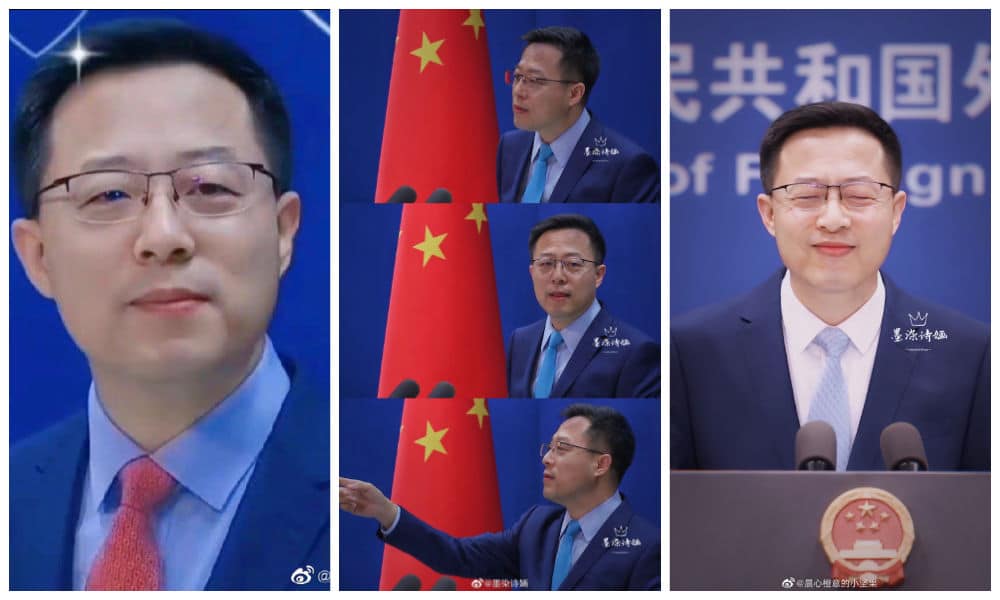
Even though Zhao has left his post as spokesperson, the online communities dedicated to him are still lively.
Before Zhao’s rise to fame, China’s MFA spokespeople and other diplomats had already gained an online fanbase. Around 2017, the concept of China’s “diplomat dream team” (外交天团) started to be used more frequently by Chinese media and social media users.
This was around the same time when Hong Lei (洪磊), Geng Shuang (耿爽), Lu Kang (陆慷), and Hua Chunying (华春莹) served as spokespeople for the Foreign Ministry and when their remarks on diplomatic events carried a more assertive and confrontational tone of voice facing heightening tensions with the U.S. over trade, the South China Sea, and human rights.
For example, China Daily ran an article about the “wonderful responses” from China’s diplomat dream team in 2017 (link) and they ran another similar one in 2018 (link).
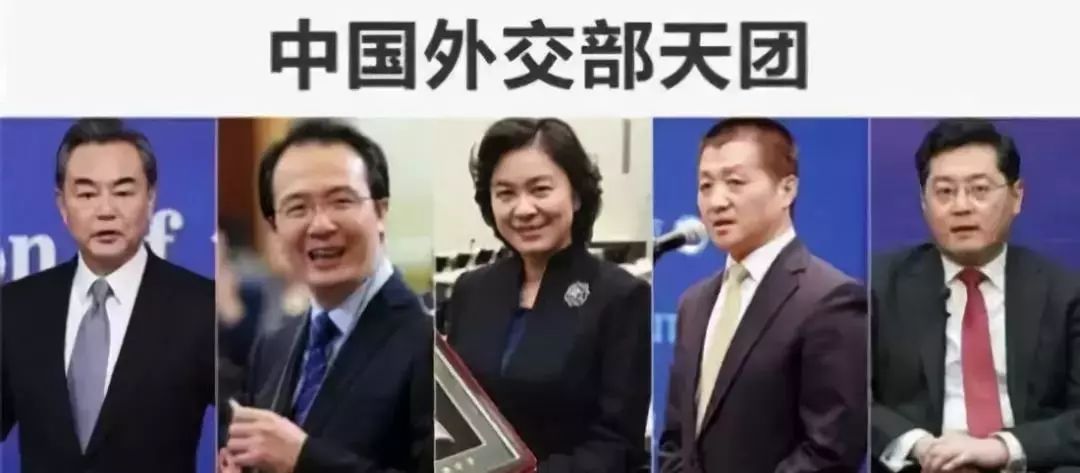
An early example of China’s “Diplomat Dream Team.” Left: China’s top diplomat Wang Yi, former spokesperson Hong Lei, spokesperson Hua Chunying, diplomat Lu Kang, and Minister of Foreign Affairs Qin Gang.
But it was not until 2020 when China’s top diplomats and the “spokesperson top team” (发言人天团) really garnered online attention as they were often featured in headlines and created a stir.
Not only was 2020 the year that ‘celebrity diplomat’ Zhao Lijian joined the spokesperson team, it was also a year of complex international developments including the Covid outbreak and worsening diplomatic relations between the U.S. and China driven by ‘eye for an eye’ strategies; one day after the Chinese consulate in Houston was forced to close, China also ordered the American consulate in Chengdu to shut its doors.
In July of 2020, Wang Wenbin joined the ‘top team’ of Chinese diplomats, which was praised online as China’s “strongest diplomatic mission.”
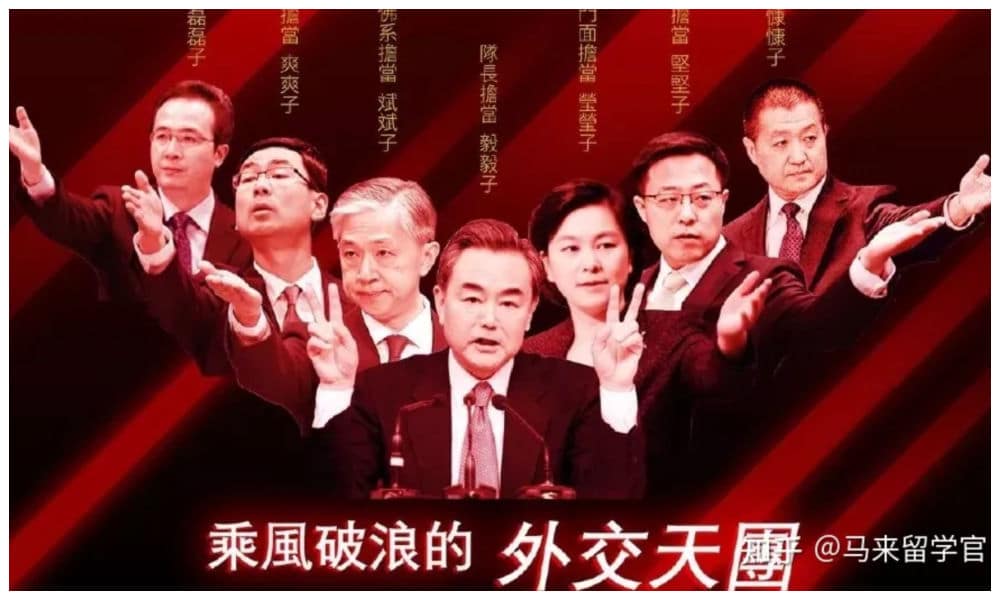
China’s “diplomat top team,” image via Zhihu blogger.
In 2021, the top-level US-China talks in Alaska further contributed to the social media frenzy surrounding China’s diplomatic corps. Foreign Minister Wang Yi, also nicknamed the ‘captain’ of the diplomatic team, traveled to Anchorage with Chinese top diplomat Yang Jiechi (杨洁篪) for the tough meeting. Before entering a session of the high-level talks, the diplomats were filmed walking together when Wang asked Yang if he had lunch, with Yang then answering: “Yes, I had instant noodles.”
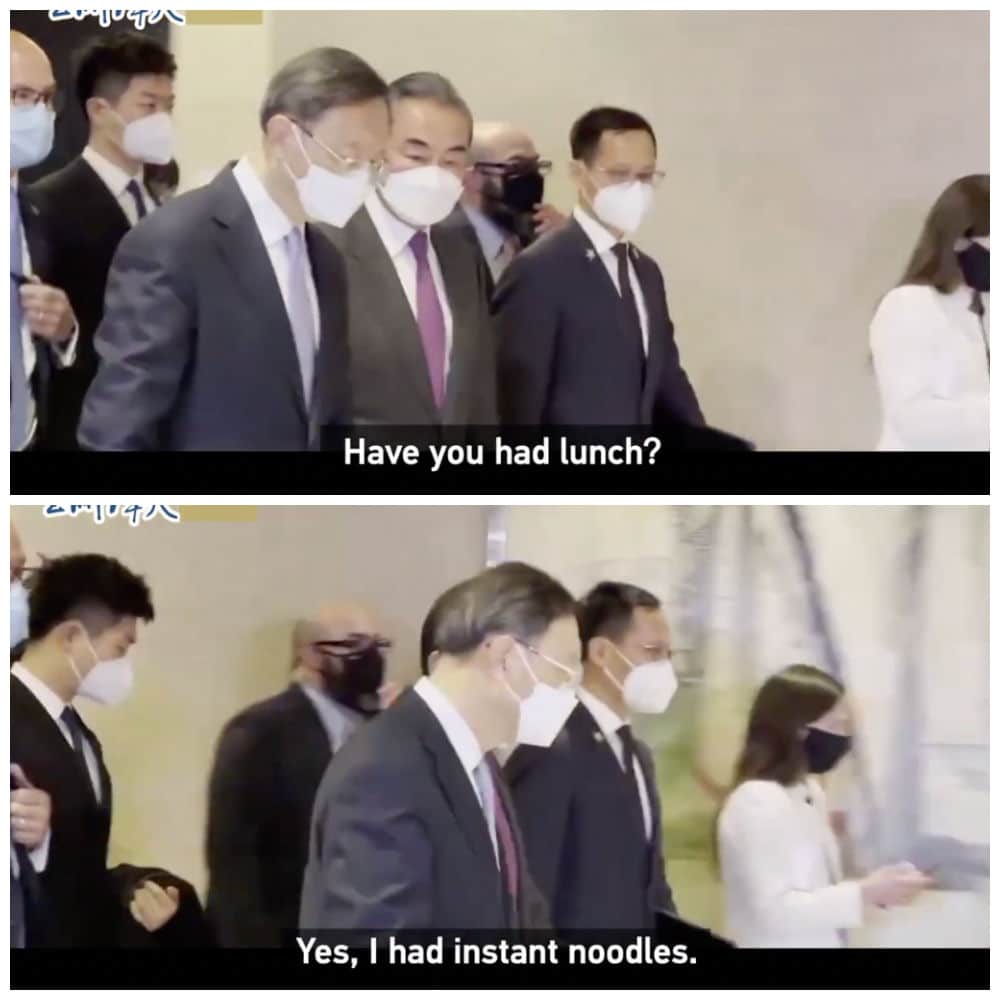
‘Noodle gate’ blew up on Chinese socials, where many saw the incident as a sign of American inhospitality and rude treatment of the Chinese top diplomats. The incident also added to the popularity of Yang Jiechi and Wang Yi.
There are various reasons why Chinese diplomats and MFA representatives have become particularly popular over the past few years.
Some of the main causes related to the celebrity culture surrounding Chinese modern-day diplomats lies in (1) their new role in China’s (online) media environment, (2) the way they have become an example to ordinary people, and (3) the shift in Chinese diplomacy that has turned them into ‘wolf warrior’ heroes.
1. CHINESE DIPLOMATS & SOCIAL MEDIA
Chinese Diplomacy in the Age of Social Media
The growing fame of Chinese diplomats and spokespeople is very much an online phenomenon, and so their surge in popularity goes hand in hand with the rise of (China’s) social media.
The role of social media is crucial in three ways. First, Chinese official accounts and state media use social media as an important channel to spread official propaganda and narratives. Although China’s MFA spokespersons are meant to be the face of China to the world, their role is just important – and perhaps even more weighty – for the audiences at home as symbols of China’s foreign policies.
Second, social media is also increasingly used by Chinese diplomats individually as a platform to voice the stances they represent. In an article titled “China’s Internet Celebrity Diplomats” (2020), Christian Shepherd described how Zhao Lijian used social media to build “a personal brand that is rare for a Foreign Ministry spokesperson” as China’s most high-profile official on Twitter.
In our 2020 article about this topic, What’s on Weibo found that there was a significant surge in Chinese official accounts arriving on Twitter in 2019 and in early 2020. The first surge of Chinese diplomatic accounts happened in 2019 at the time of the Hong Kong Protests; a second peak in Chinese official accounts joining Twitter took place in the period of January to March 2020 during the international Covid-19 crisis.
At the time of writing, Zhao has over two million followers on Twitter (@zlj517). Zhao Lijian is also active on Weibo (@赵立坚个人微博), where he has over 8 million fans. Foreign Ministry spokesperson Hua Chunying is not active on Weibo, but she has two million followers on Twitter (@Hua Chunying 华春莹).

Wang Wenbin, Geng Shuang, Wang Yi, Hua Cunying, Zhao Lijian.
Third, social media platforms allow for communities to form around Chinese diplomats in a way that would be unthinkable in the pre-social media era.
There has been a lot of attention for celebrities taking on diplomatic roles, but less so for diplomats taking on celebrity roles. Studies about diplomats or politicians becoming internet celebrities often focus on those who are also active on social media themselves, making them more accessible and relatable.
But diplomats such as Wang Wenbin are an exception: Wang Wenbin does not have an official Twitter account, nor is he active on Weibo or any other popular social media platforms. Nevertheless, there are thriving online communities surrounding him that help bridge the divide between the top level diplomat and ordinary people, creating connections between diplomats and Chinese people in novel ways.
In the Chinese social media environment, the fan culture surrounding China’s top diplomats is fuelled by the dynamics of the official propaganda apparatus and state media campaigns disseminating hashtags and videos that underline the main messages of China’s Foreign Ministry. Although it often builds on official media content, the online fan culture itself is non-official and functions in similar ways as other idol fan communities do.
2. CHINESE DIPLOMATS & THE PEOPLE
The Person Behind the Diplomat
There is another dimension to the online interaction between netizens and the Chinese Ministry of Foreign Affairs spokespersons and diplomats. They are not just being idolized, they are also being humanized.
Besides the more serious patriotic and nationalist videos, it is often the small flaws and funny interactions that go trending on social media and make China’s diplomats more likeable to the audience.
Fans of Wang Wenbin or Zhao Lijian like to create images or videos that highlight the moments in which the diplomats share a quick smile, make a little mistake, or are caught in a situation that is different from their usual role as spokesperson.
It might be as small as a strand of hair sticking out during a speech, a misunderstanding with a journalist, or how Wang Wenbin is fiddling with his translation headset during an international conference. These kind of moments are not highlighted to ridicule the diplomat; on the contrary, netizens treasure these moments in which diplomats become more likable and relatable.
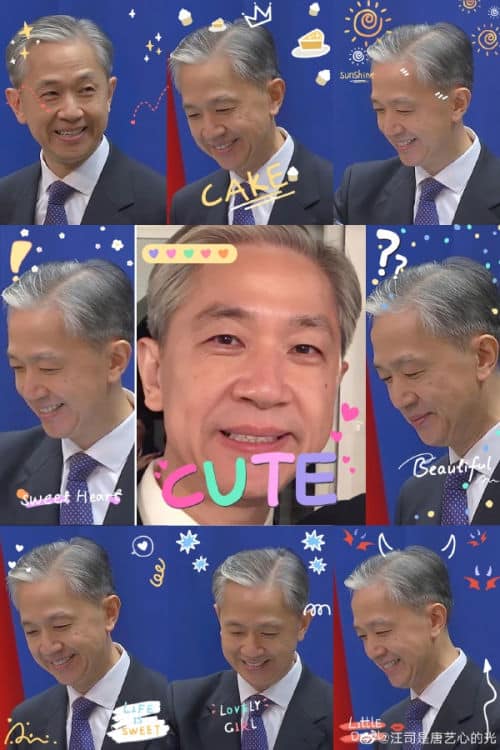
Another way in which netizens like to catch a glimpse of the private person behind the public diplomat is by sharing old photos and getting to know more about them in their younger years.
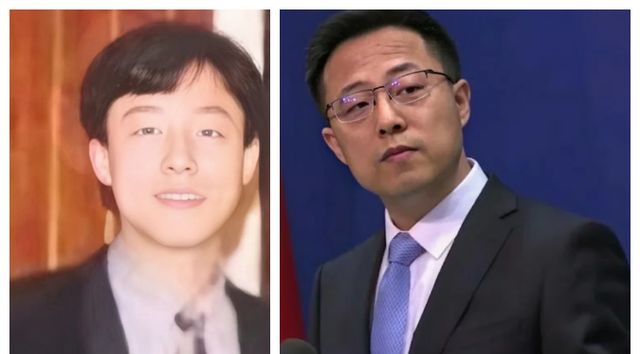
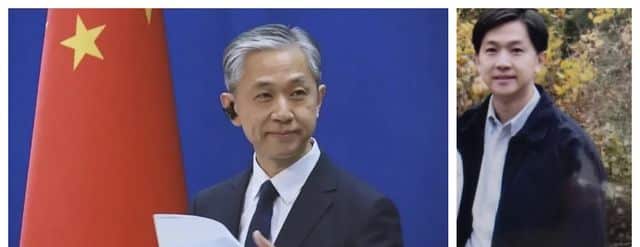
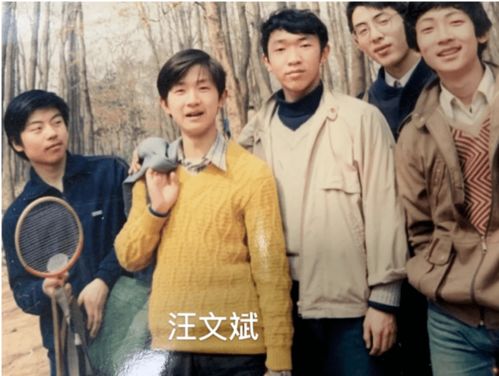
Wang Wenbin in his younger years.
On Weibo, Bilibili, and Douyin, there are dozens of videos comparing photos of Chinese diplomats, including Wang, in their younger years versus now (e.g. 外交天团年轻的样子).
For many fans, Chinese diplomats also serve as an inspiration. “I love them, they’re my role models,” one Weibo blogger writes, posting photos of diplomats such as Wang Yi, Hua Chunying, Zhao Lijian, Hong Lei, Geng Shuang, and Lu Kang.
For many, Wang Wenbin especially is a role model because of his language skills. Wang speaks several foreign languages including English and French. He previously also attracted attention for sending out new year’s wishes in 11 different languages.
“I really like him because he encourages me to do well in my studies,” one fan account (@是汪叔和赵叔啊) writes.
3. CHINESE DIPLOMATS & THE WORLD
Wolf Warrior Heroes
The widespread admiration for Chinese diplomats and MFA spokespersons has various social, cultural, and historical reasons, and nationalism also plays a big role in this, as their growing online popularity is accompanied by the rise of so-called “wolf-warrior diplomacy” and the soaring cyber nationalism that comes with it.
The term “wolf warrior diplomacy” (战狼外交) became a buzzword for China’s diplomacy since around 2020 (Dai & Luqiu 2022). It is a reference to the highly successful Chinese blockbusters Wolf Warrior (战狼, 2015) and Wolf Warrior II (战狼2, 2017), and basically means a style of diplomacy that uses a much harsher and more confrontational rhetoric – which poses a contrast to a more restrained and softer tactic in foreign diplomacy.
Hua Chunying and Zhao Lijian were among the most visible wolf warrior diplomats as they were the main MFA spokespersons in early 2020 and were both active on Twitter, where they also actively confronted external criticism of China.
Zhao Lijian also became known for tweeting out a photoshopped image of an Australian soldier murdering a child, alluding to a report on unlawful killings of Afghan civilians and prisoners by Australian troops. His controversial post led to Australian Prime Minister Scott Morrison demanding an apology from China (read more about this kind of political visuals in our article here).
In a 2022 article titled “Why Have Chinese Diplomats Become So Aggressive?,” author Nien-chung Chang-Liao argues that China’s more aggressive style of diplomacy is not just meant to persuade foreign audiences to accept Chinese narratives in international relations, but could also be viewed as a way to appeal to nationalist attitudes at home, while also demonstrating loyalty to the Party and Xi Jinping – who emphasizes the need for confidence in China’s new era.
The approach seems fruitful: over 70% of respondents to a survey by Global Times allegedly indicated that they thought a ‘wolf-warrior’ style diplomacy improves China’s global image. Chinese Foreign Ministry spokesperson Hua Chunying also indicated that she had no issue with the ‘wolf warrior’ label and even embraces it (Chang-liao 2022, 179-181).
While Zhao Lijian was known as the real ‘wolf warrior diplomat,’ Wang Wenbin’s style is perceived as being more “calm,” “scholarly,” and “refined,” even though he he still seen as critical and assertive.
Recently, it was Wang Wenbin who slammed U.S. claims that China might arm Russian troops in the war in Ukraine, saying “it is the United States and not China that is endlessly shipping weapons to the battlefield.” Wang also called the shootdown of the alleged Chinese spy balloon “100 percent hysteria,” and he recently urged the United States to give up its “hegemonic” approaches to international affairs.
For many Wang Wenbin fans, this style of assertive yet ‘refined’ foreign policy strikes a chord, as they support how Wang shapes China’s image abroad: “It’s the perfect interpretation of being a great and elegant great power.”
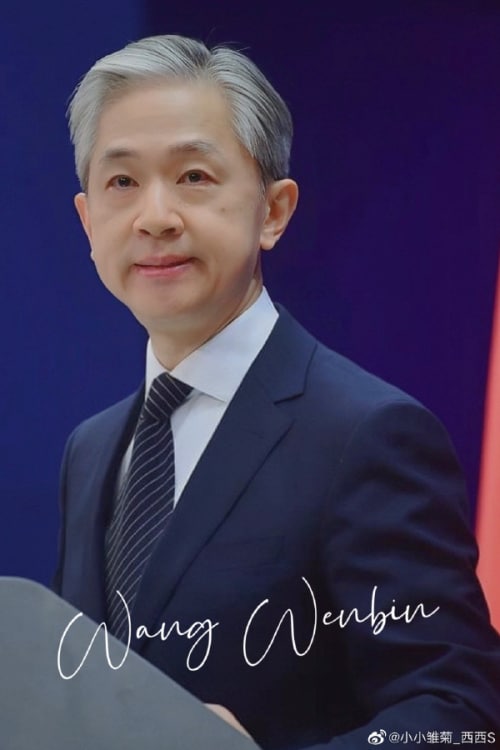
“Today’s problems are complex and manifold, but Uncle [Wang] is organized and clear and answers with a smile. From beginning to end, I always admire him,” one comment says.
One Weibo blogger writes to Wang: “You’re so busy, you must be tired. I hope you can also take some time to rest. I just wish you all the best.”
Another fan writes: “Uncle, you work so hard, you are not afraid of facing the ‘hail of bullets’ fired at you by foreign media in the blue room, you defend our country, you are our hero!”
By Manya Koetse
Get the story behind the hashtag. Subscribe to What’s on Weibo here to receive our newsletter and get access to our latest articles:
References
Chang-Liao, Nien-chung. 2022. “Why Have Chinese Diplomats Become So
Aggressive?” Survival, 64:1: 179-190.
Dai, Yaoyao, and Luwei Rose Luqiu. 2022. “Wolf Warriors and Diplomacy in the New Era.” China Review 22 (2): 253-283.
Shepherd, Christian. 2020. “China’s Internet Celebrity Diplomats.” Australian Financial Review, Dec. 10, page 27.
Spotted a mistake or want to add something? Please let us know in comments below or email us. First-time commenters, please be patient – we will have to manually approve your comment before it appears.
©2023 Whatsonweibo. All rights reserved. Do not reproduce our content without permission – you can contact us at info@whatsonweibo.com.
The post China’s Celebrity Diplomats: The Online Fan Culture Surrounding Foreign Ministry Spokesperson Wang Wenbin appeared first on What's on Weibo.